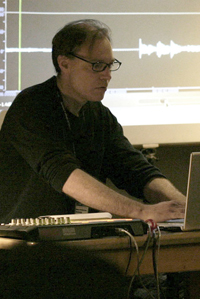
David Doms
For media inquiries, please contact Media Relations
David Doms has a long history of teaching MIDI and music synthesis. At Berklee, he currently teaches Advanced Digital Sampling, Advanced MIDI Systems, and MIDI systems, and before coming to Berklee, he spent 10 years at the New England Institute of Art teaching music synthesis and MIDI.
Doms has composed and produced television and radio commercials for regional and national broadcasts, corporate video, and film including music for NBC, Fox TV, Xerox, and Gillette. He is a published songwriter with Warner/Chappell and DSM Music. As a producer, musician, and songwriter, his work has appeared on numerous releases including those of Down Avenue (RCA), Robin Lane, Charles Pettigrew (formerly of Charles and Eddie), Laurie Geltman, and Ivan de Prume. His current project, Dreamtime9, is a combination of fuel-injected jazz- and blues-based songs, integrated with ambient laptop and spoken word. Doms performs regularly in the Boston area and is working on a new release with Dreamtime9.
- Composed and produced television and radio commercials for regional and national broadcasts, corporate video, and film, including music for NBC and Fox
- Published songwriter with Warner/Chappell and DSM Music
- Author of Berklee Online's Sampling and Audio Production course
- As a producer, musician, and songwriter, has appeared on numerous releases, including those of Down Avenue, Robin Lane, Charles Pettigrew (formerly of Charles and Eddie), Laurie Geltman, and Ivan de Prume
